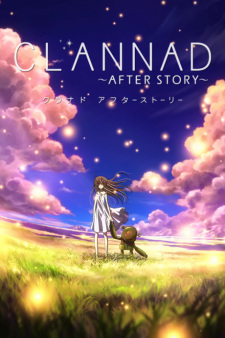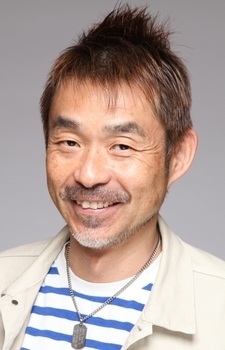
Clannad: After Story
Summary: Tomoya Okazaki and Nagisa Furukawa have graduated from high school, and together, they experience the emotional rollercoaster of growing up. Unable to decide on a course for his future, Tomoya learns the value of a strong work ethic and discovers the strength of Nagisa's support. Through the couple's dedication and unity of purpose, they push forward to confront their personal problems, deepen their old relationships, and create new bonds.
Time also moves on in the Illusionary World. As the plains grow cold with the approach of winter, the Illusionary Girl and the Garbage Doll are presented with a difficult situation that reveals the World's true purpose.
[Written by MAL Rewrite]
Description
Tomoya Okazaki and Nagisa Furukawa have graduated from high school, and together, they experience the emotional rollercoaster of growing up. Unable to decide on a course for his future, Tomoya learns the value of a strong work ethic and discovers the strength of Nagisa's support. Through the couple's dedication and unity of purpose, they push forward to confront their personal problems, deepen their old relationships, and create new bonds.
Time also moves on in the Illusionary World. As the plains grow cold with the approach of winter, the Illusionary Girl and the Garbage Doll are presented with a difficult situation that reveals the World's true purpose.
[Written by MAL Rewrite]
Available At
Warning: Array to string conversion in /home/hianime.me.uk/public_html/anime.php on line 243
Array
Clannad: After Story Trailers
Clannad: After Story Pictures
Clannad: After Story Review
Clannad: After Story — Tomoya Okazaki and Nagisa Furukawa have graduated from high school, and together, they experience the emotional rollercoaster of growing up. This overview is intentionally spoiler-free and focuses on tone and intent rather than plot specifics.
Thematically, It sits firmly within Drama, Romance conventions as a TV work and has garnered attention (MAL score: 8.93). This work explores character dynamics, tonal shifts, and the interplay between narrative ambition and execution. The story's pacing and tonal choices are crafted to complement the central ideas, often emphasizing atmosphere and emotional truth over explicit exposition. The show's ability to evoke a consistent mood — whether melancholic, exuberant, or contemplative — is a recurring strength, and the scenes are constructed so viewers can infer stakes without needing explicit spoilers.
Characterization is a core pillar here. Protagonists and supporting figures are written with distinct motivations and narrative roles; even when archetypal, the series invests in small behavioral details that make choices feel earned. Character arcs are handled with an eye for gradualism: development often arrives through incremental beats rather than abrupt, expository shifts. The interactions between characters create texture, and relationships are used to illuminate both personal flaws and larger thematic concerns.
On the visual front, production values play a significant role. The animation quality varies by sequence but frequently showcases thoughtful direction and composition. Background art, framing, and color palettes are used deliberately to support tone — quieter scenes favor muted palettes while action or heightened emotional beats employ brighter, more kinetic visuals. Direction choices, such as camera movement and shot selection, often elevate scenes beyond their raw script, creating moments that linger in the viewer's mind.
The soundscape — score, incidental music, and sound design — complements the visual language. Music cues are placed to maximize emotional resonance without manipulating the audience with melodrama; this restraint often leads to more authentic emotional payoff. Sound design punctuates key moments, and when the series leans on silence, those quieter moments are given weight by measured audio choices.
Pacing and structure are handled with craft. Episodes are arranged to build tension and release methodically, and the narrative rarely rushes through important emotional beats. That said, the deliberate pacing may feel slow to viewers who prefer faster plot turnover; the reward is greater nuance and an accumulation of meaning across the series. Accessibility is generally good — one can appreciate surface-level pleasures, while repeat or attentive viewing reveals additional layers.
No title is without flaws. Occasional unevenness in subplots or variable animation across episodes can be distracting. Some tonal shifts might feel abrupt if you expect uniformity; others will argue that those shifts are purposeful. These are worth noting, but they seldom undercut the larger achievements of the work.
In sum, Clannad: After Story offers a rich experience for viewers who value character-driven storytelling, considered visual design, and a soundtrack that supports rather than overwhelms. For fans of Drama, Romance, this is an especially rewarding watch. It's recommended for those who appreciate layered narratives and artistry in animation, and best approached with patience and attention to nuance.
Characters & Voice Actors

Furukawa, Nagisa
Main

Furukawa, Nagisa
Main

Furukawa, Nagisa
Main

Okazaki, Ushio
Main

Okazaki, Ushio
Main

Okazaki, Ushio
Main

Okazaki, Tomoya
Main

Okazaki, Tomoya
Main

Okazaki, Tomoya
Main

3-A Teacher
Supporting

3-A Teacher
Supporting

Child on Train
Supporting

Family Restaurant Manager
Supporting

Family Restaurant Manager
Supporting

Family Restaurant Manager
Supporting

Fujibayashi, Ryou
Supporting

Fujibayashi, Ryou
Supporting

Fujibayashi, Ryou
Supporting

Fujibayashi, Ryou
Supporting

Fujibayashi, Kyou
Supporting
Staff

Hatta, Youko
Producer

Nakamura, Shinichi
Producer

Nakayama, Yoshihisa
Producer

Tafu, Naohiro
Producer

Matsunaga, Yuuichi
Assistant Producer

Ishihara, Tatsuya
Director, Episode Director, Storyboard

Tsuruoka, Youta
Sound Director

Ishidate, Taichi
Episode Director, Storyboard

Kigami, Yoshiji
Episode Director, Storyboard

Kitanohara, Noriyuki
Episode Director, Storyboard

Sakamoto, Kazuya
Episode Director, Storyboard

Takao, Noriko
Episode Director, Storyboard, Key Animation

Yamada, Naoko
Episode Director, Storyboard, Key Animation

Yoneda, Mitsuyoshi
Episode Director, Storyboard, Key Animation

Shimo, Fumihiko
Script, Series Composition

Takemoto, Yasuhiro
Storyboard, Key Animation

ANANT-GARDE EYES
Theme Song Arrangement

Fukushi, Kentarou
Theme Song Arrangement

Kai
Theme Song Lyrics

Lia
Theme Song Performance, Inserted Song Performance